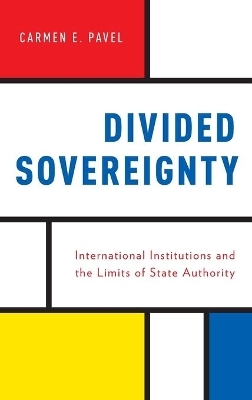
Divided Sovereignty
Oxford University Press Inc (Verlag)
978-0-19-937634-6 (ISBN)
Divided Sovereignty explores new institutional solutions to the old question of how to constrain states when they commit severe abuses against their own citizens. The book argues that coercive international institutions can stop these abuses and act as an insurance scheme against the possibility of states failing to fulfill their most basic sovereign responsibilities. It thus challenges the long standing assumption that collective grants of authority from the citizens of a state should be made exclusively for institutions within the borders of that state. Despite worries that international institutions such as the International Criminal Court could undermine domestic democratic control, citizens can divide sovereign authority between state and international institutions consistent with their right of democratic self-governance.
States are imperfect, incomplete political forms. They presuppose a monopoly of coercive power and final jurisdictional authority over their territory. These twin elements of sovereignty and authority can be used by state leaders and political representatives in ways that stray significantly from the interests of citizens. In the most extreme cases, when citizens become inconvenient obstacles in the pursuit of the self-serving ambitions of their leaders, state power turns against them. Genocide, torture, displacement, and rape are often the means of choice by which the inconvenient are made to suffer or vanish.
The book defends universal, principled limits on state authority based on jus cogens norms, a special category of norms in international law that prohibit violations of basic human rights. Against skeptics, it argues that many of the challenges of building an additional layer of institutions can be met if we pay attention to the conditions of institutional success, which require (1) experimentation with different institutional forms, (2) limitations on the scope of authority for coercive international institutions through clear, narrow, well defined mandates, and (3) understanding the limits of existing knowledge on institutional design, which should make us suspicious of proposals for grand institutional schemes, such as global democracy.
Associate Director & Research Professor, University of Arizona Center for Philosophy and Freedom
Introduction ; 1. Why Divided Sovereignty? ; 2. Method and Justification ; 3. Outline of the Book ; Chapter 1 Sovereignty, the Social Contract, and the Incompleteness of the State System ; 1. The Institutions of the Social Contract ; 2. On Sovereignty and Delegation of Authority ; 3. Problems of Institutional Design ; 4. Conceptual and practical Hurdles to Divided Sovereignty ; 5. Conclusion ; Chapter 2 Divided Sovereignty: the Principal-Agent Model ; 1. Sovereignty Limiting Norms and their Current Effects ; 2. Divided Sovereignty: The Principal-Agent Model ; 2.1 The Origins of the Model ; 2.2 The Principle-Agent Model for International Institutions ; 2.3 Delegation ; 2.4 The Role of Consent ; 3. Agency Costs at the International Level ; 4. Why Use Principal-Agent Theory? ; 5. Conclusion ; Chapter 3 Domestic and International Implications: Slavery, Genocide and Civil War ; 1. The Scope and Limits of International Authority ; 2. Constitutional Interpretation and Change ; 3. Slavery ; 4. Genocide ; 5. Civil Wars and Failed States ; 6. Conclusion ; Chapter 4 Theories and Institutional Facts ; 1. One Step Theorizing: Cosmopolitan Justice ; 2. Two Step Theorizing: The Case of Humanitarian Intervention ; 3. Objections ; 4. Conclusion ; Chapter 5 Romanticizing Institutions ; 1. Cosmopolitan Global Democracy ; 2. Rule of Law Experiments ; 3. Rule of Law for Global Democracy ; 4. Institutional Assumptions and Bureaucratic Pathologies ; 5. Conclusion ; Chapter 6 Institutional Pluralism ; 1. Institutions in International Criminal Law ; 2. Fragmentation and Conflict ; 3. The Benefits of a Pluralist System ; 4. Complex Social Orders ; 5. A Hobbesian Challenge ; 6. Conclusion ; Chapter 7 The Possibility of Rule-Governed Behavior in International Politics ; 1. Cooperation under Anarchy ; 2. Assumptions and Implications of International Relations Theorizing ; 3. Self-Preservation as the Dominant State Preference ; 4. The Possibility of a Rule-Governed Order ; Conclusion
| Erscheint lt. Verlag | 11.12.2014 |
|---|---|
| Verlagsort | New York |
| Sprache | englisch |
| Maße | 236 x 160 mm |
| Gewicht | 508 g |
| Themenwelt | Recht / Steuern ► EU / Internationales Recht |
| Recht / Steuern ► Öffentliches Recht ► Völkerrecht | |
| Sozialwissenschaften ► Politik / Verwaltung ► Europäische / Internationale Politik | |
| Sozialwissenschaften ► Politik / Verwaltung ► Politische Theorie | |
| ISBN-10 | 0-19-937634-4 / 0199376344 |
| ISBN-13 | 978-0-19-937634-6 / 9780199376346 |
| Zustand | Neuware |
| Haben Sie eine Frage zum Produkt? |
aus dem Bereich


